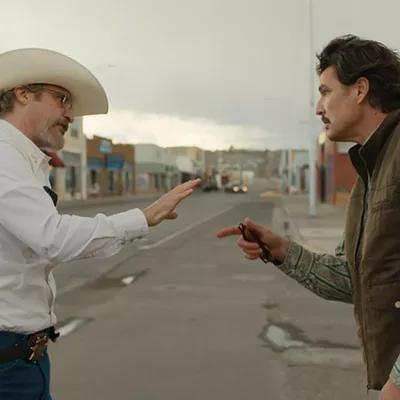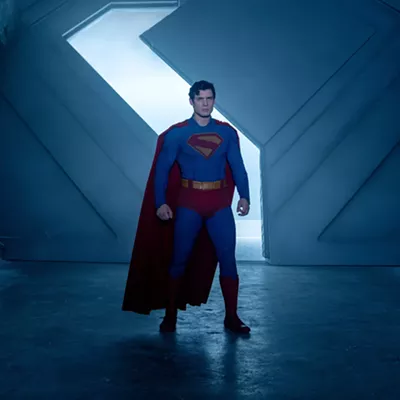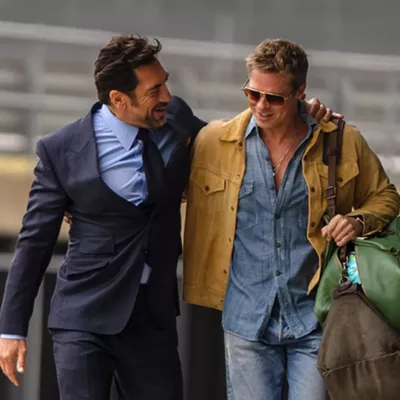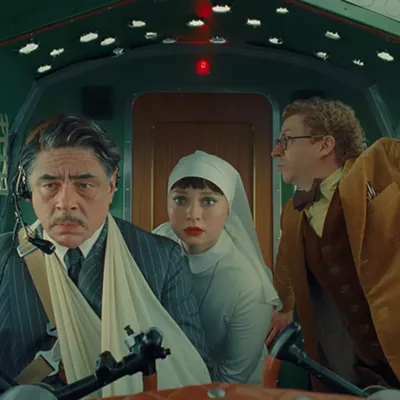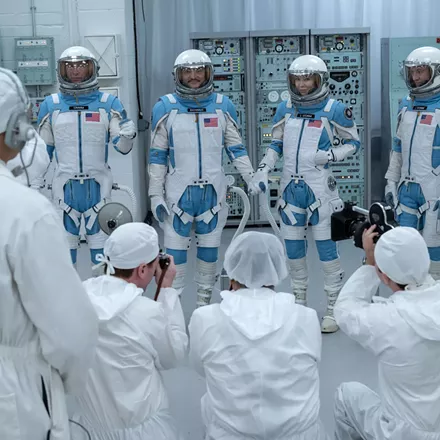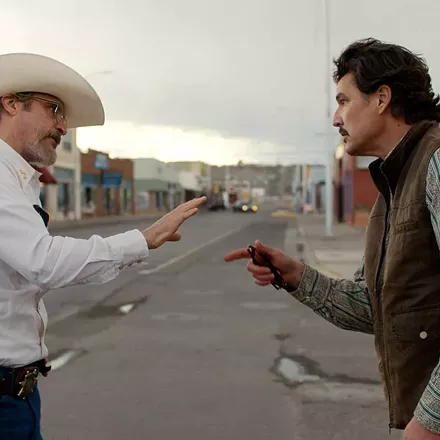1984's Stop Making Sense begins with Talking Heads frontman David Byrne walking out onto the stage with nothing but an acoustic guitar and a boombox. He hits play and performs a jittery, stripped-down version of "Psycho Killer," before being joined by bassist Tina Weymouth for a spare duet of "Heaven." Then drummer Chris Frantz comes out, then keyboardist and guitarist Jerry Harrison, and then the backup singers and the auxiliary percussionists, and by the fifth or sixth song, the stage is overflowing with performers.
Byrne envisioned Stop Making Sense as something of a conceptual deconstruction of the moving parts that make a concert work, deliberately laying bare the behind-the-scenes mechanisms that have to click together like cogs in a machine. He treats the rock concert as an interactive installation: It's as much about the Talking Heads' songs as it is about movement, color, patterns and the sheer kinetic energy of its performers.
American Utopia, the new HBO Max documentary of Byrne's recent Broadway residency, continues this idea of rock concert as art piece, and in its best moments it's nearly as radical and as gripping as Stop Making Sense. This is high praise, since that earlier film, directed by the late Jonathan Demme, is arguably the greatest concert film of them all.
But Byrne, now in his late 60s, is in top form here, and watching American Utopia back-to-back with Stop Making Sense, it's interesting to see how his poise has changed. In the 1984 film, he's an ambitious upstart with an impish sense of humor who's playing around with form. In this new film, he's a cultural institution, a living monument to the New York post-punk scene he helped establish, and yet he's still finding new ways to top himself.
The show is set on a sparse stage — there's no equipment or elaborate decoration, merely a chainmail-like curtain around the perimeter that performers will occasionally disappear through. Byrne and his 11-person backing band, barefoot and adorned in matching grey suits, wear marching band-style instruments so they can move around freely in drumline formations. They blaze through a 21-song set, making detours through iconic Talking Heads songs like "Once in a Lifetime" and "Burning Down the House." There's the occasional chiaroscuro lighting cue or a strobe effect to emphasize changes in the music, but for the most part, this is a black-box experience.
The show is a perpetual motion machine: It's never not doing something. The musicians always seem to be mutating into a new abstract shape, a single-cell organism that's perpetually expanding and contracting. Byrne is usually flanked by two backup singers who employ a lithe, balletic choreography that often resembles interpretive dance or particularly flowery ASL. The camera is mostly at the eye level of the audience, but we sometimes get angles looking down at the stage from above so we can admire the complexity of their movements. You get a sense that the show itself was designed for the inevitable concert film that would be made of it.
American Utopia was directed by Spike Lee, and it's his second great achievement this year after his Netflix war film Da 5 Bloods. As Jonathan Demme did in Stop Making Sense, Lee captures the immediacy and electricity of live music, of being in this theater with these performers at this exact time. Byrne's artistic vision is obviously at the forefront of the film, but Lee's directorial hand becomes apparent in the film's most remarkable performance, a cover of Janelle Monae's "Hell You Talmbout." The song, which takes the form of a funereal chant, addresses police brutality toward Black people, calling out the victims by name. Lee intercuts this footage with blown-up photos of the men and women addressed in the lyrics, his camera pushing in on their faces, and it's one of the great achievements of his career.
The design of American Utopia itself — sleek, grey, minimalist, well-calibrated — reflects the robotic remove of Byrne's lyrics, and the odd ways that he has always related to technology, romance, corporate culture and basic social routines. And yet for all the meticulous control that went into it, American Utopia is hardly lifeless. It's bursting with invention and energy and spontaneity and goodwill, and when Byrne talks about the importance of connection — about the connection between creativity and expression, the connection firing between the synapses in our brains, the connection between performer and audience — it's not just a nifty thematic device. He really means it. ♦




